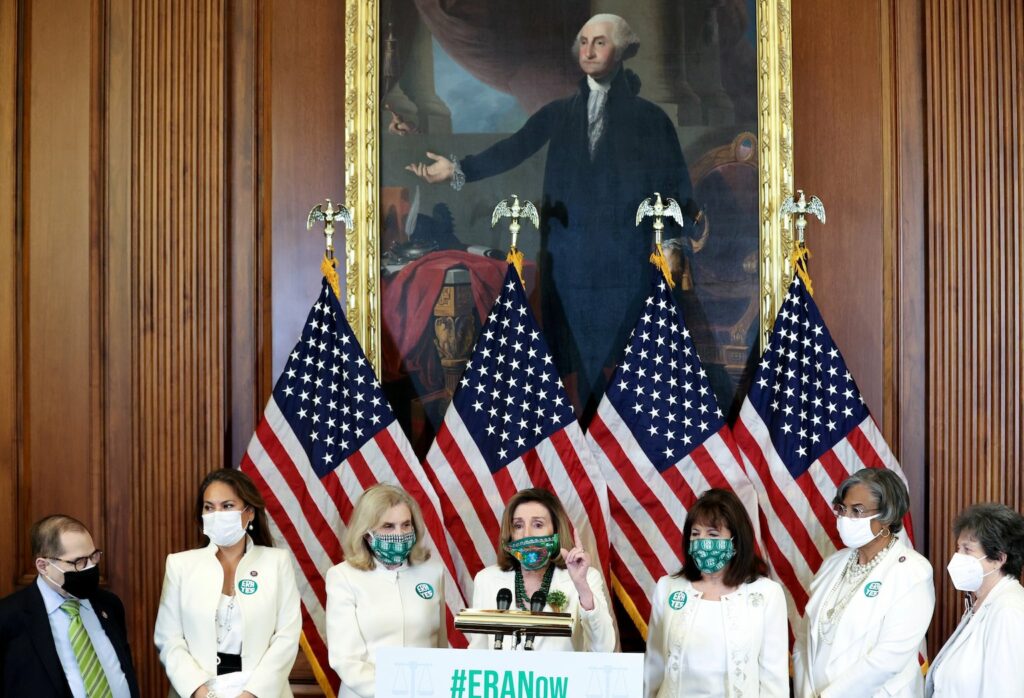WASHINGTON (CNS) —If the Equal Rights Amendment were to become part of the U.S. Constitution, its opponents say, it will actually harm women’s interests and invalidate pro-life policies, such as the federal Hyde Amendment and all state restrictions on tax-funded abortions.
Its supporters say it will protect women from discrimination in the workplace, domestic violence and sexual harassment.
The amendment states: “Equality of rights under the law shall not be denied or abridged by the United States or by any state on account of sex.”
On March 17, the U.S. House voted 222-204 to remove an expired deadline for ratification of the ERA. Now the Senate has to take up the measure; it will need 60 votes to pass.
“Pro-abortion leaders have largely ignored, trivialized or denied the fact that activists plan to aggressively use the federal ERA as currently written in a litigation strategy to overturn all pro-life laws and policies including restrictions supported by huge majorities of Americans,” said Rep. Chris Smith, R-N.J., a Catholic, who is co-chair of the Congressional Pro-Life Caucus.
The National Organization for Women has made ratifying the amendment a top priority “because equality in pay, job opportunities, political structure, education, health care, including reproductive health care, and education will remain elusive without a guarantee in the U.S. Constitution.”
In remarks on the floor of the House late March 16, Smith said: “I believe that all human beings —especially the weakest and most vulnerable including unborn baby girls and boys —deserve respect, empathy, compassion and protection from violence.”
“I strongly believe in equal rights for women. I’ve introduced the ERA with the abortion-neutral language,” he added.
He said there are a number of laws now in place that already provide the protections ERA supporters say are needed for women, and they started out as bills he has strongly supported, or in some cases, sponsored.
Smith wrote the Trafficking Victims Protection Act of 2000, “a comprehensive whole-of-government initiative to combat sex and labor trafficking in the United States and around the world.” This law reauthorized and “significantly expanded” the Violence Against Women Act. He has written four other anti-trafficking laws in the intervening years.
Among measures he voted for, he said, was the Lilly Ledbetter Fair Pay Act of 2009, which requires employers to ensure that their pay practices are nondiscriminatory and to make certain that they keep the records needed to prove the fairness of pay decisions.
President Barack Obama signed it into law Jan. 29, 2009, just days after he was inaugurated as the nation’s 44th president.
Smith also backed the Survivors’ Bill of Rights Act of 2016, which established, for the first time, statutory rights in federal code for survivors of sexual assault and rape.
“Ensuring equal rights for women and serious protections against violence requires laws, policies and spending priorities to achieve those noble and necessary goals —without putting unborn baby girls and boys at risk of death,” he said.
Other opponents of the ERA include National Right to Life. Its senior policy adviser, Douglas D. Johnson, directs the organization’s ERA Project. “If an ERA revival measure … were ever to pass both houses, it will face long odds in the federal courts,” he said March 16.
Congress passed the ERA in 1972 and initially gave states until 1979 to ratify it. A proposed amendment becomes part of the Constitution as soon as it is ratified by three-fourths of the 50 states, or 38. The ratification deadline was extended to 1982, but the effort fell three states short of the number needed.
In 2017, Nevada voted to ratify it, followed by Illinois in 2018 and Virginia in January 2020, but Judge Rudolph Contreras of the U.S. District Court of the District of Columbia ruled March 5 of this year these votes “came after both the original and extended deadlines that Congress attached to the ERA.”
The states now have the option of appealing the ruling. The case is likely headed to the U.S. Supreme Court.
The late Phyllis Schlafly, a Catholic, counted stopping ratification of the ERA in the 1970s as one of her first major victories as a pro-life activist. Her group, STOP ERA, later became the Eagle Forum.

